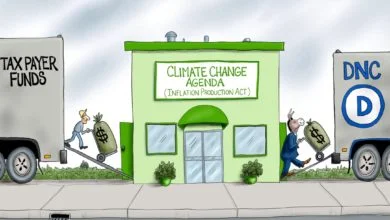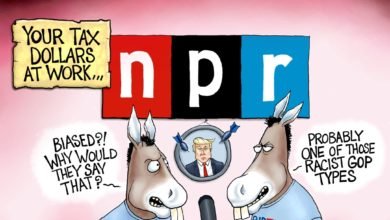Ted Cruz Just Perfectly Explained Why Congress Shouldn’t Regulate Cryptocurrency
The sweeping “infrastructure” legislation making its way through Congress takes a pretty flexible view of what counts as “infrastructure.” Evidently, cryptocurrency regulation makes the cut, as the bill includes a provision imposing costly regulations on the digital, decentralized currency industry.
But some skeptics are sounding the alarm, and warning that Congress’s attempt to regulate newfangled technology its members hardly understand is sure to backfire. Sen. Ted Cruz took an impassioned stand to this effect on Monday, and his warning quickly went viral.
First, some background on the regulation itself.
As FEE’s Peter Jacobsen recently explained, the provision increases reporting requirements on cryptocurrency transactions, in hopes of cracking down on tax evasion. It does so by labeling various industry actors as cryptocurrency “brokers” and imposing on brokers costly rules and requirements. But it defines “brokers” extremely broadly, in a manner that would entrap many entities and individuals who are by no means brokers in any traditional sense.
“It’s difficult to tell if this obvious mistake in the wording of the bill was due to ignorance or an attempt to sabotage the nascent industry, but, regardless, the effects will be the same,” Jacobsen explains. “Subjecting miners and software developers to cumbersome regulations they may be unable to fulfill will force individuals and businesses to either close down their crypto operations or move to a country less hostile to the industry.”
Clearly, this poorly-written and short-sighted regulatory provision could backfire—big-time. In the video that went viral, Cruz stressed this very point.
“If the underlying language in this bill goes into effect, it will have devastating effects,” the senator warned. “There is a new and exciting industry in the United States of cryptocurrency, Bitcoin or otherwise, that is generating jobs… entrepreneurs who are creating new values, new hedges against inflation, new opportunities. And it is fast-moving. It is dynamic. If this [provision] becomes law… we will be destroying billions of dollars worth of industry in the United States. We will be destroying jobs… and we will be sending them overseas.”
Sen. Ted Cruz on #crypto to the Senate: “We shouldn’t regulate something we don’t yet understand. We should actually take the time to try to understand it. We should hold some hearings … We shouldn’t destroy people’s lives and livelihoods from complete ignorance.” pic.twitter.com/pCjmTJ2YLH
— Steve Guest (@SteveGuest) August 9, 2021
Cruz also explained that this kind of dysfunction is what inevitably happens when politicians and bureaucrats huddled in Washington try to regulate complex industries they do not understand.
“The ugly truth… is that there aren’t five senators in this body with any real understanding of how cryptocurrency operates,” he continued. “And yet… this body is prepared to obliterate an industry willy-nilly. And the bureaucrats at the Treasury Department don’t understand this any better than the Senate.”
Cruz argued that if they were going to regulate cryptocurrency, the very least they ought to do is hold hearings and hear from experts what the ramifications could be. But they haven’t even done that.
“Don’t just put out a rule of massive taxes and regulations with no understanding of the consequences… and real people that would be hurt,” Cruz concluded. “I think the consequences are going to be long-standing of this foolish legislation.”
🚨🚨The Senate is on the verge of passing legislation that would be TERRIBLE for cryptocurrency.🚨🚨
The infrastructure deal contains DANGEROUS provisions that would devastate crypto and blockchain innovation.
Supporters of crypto need to make their voices heard. https://t.co/iXrcnne0tV
— Ted Cruz (@tedcruz) August 7, 2021
Whether one loves Senator Cruz or isn’t a fan, we all ought to see the wisdom in his words. One of the inherent problems with centralized planning by government regulators is that they lack the knowledge to successfully dictate rules across the economy. As Cruz notes, this mismatch is particularly acute when it comes to cryptocurrency, given the technology’s complexity, its relative newness, and the advanced age of most members of Congress.
But this principle applies more broadly than just the cryptocurrency sector. As the Nobel-Prize-winning economist Friedrich Hayek famously explained, the “knowledge problem” plagues all efforts to centrally plan the economy.
Simply put, the knowledge problem means that centralized decision-making is doomed to fail, because only those closest to a given situation have the relevant knowledge and awareness to make appropriate decisions. For example, a planning committee of bureaucrats in Washington, DC that tried to set the prices for corn sales in Iowa is far less likely to set an efficient and realistic price than if farmers themselves can respond to changes in their business and adjust prices accordingly.
Similarly, if members of Congress who probably can’t even define Bitcoin try to regulate the cryptocurrency industry, dysfunction is sure to follow. So, whether it’s Senator Cruz’s viral remarks or the classic words of Hayek, politicians who wreck the cryptocurrency industry through their regulatory arrogance can’t say they weren’t warned.
WATCH: No, Trump, Bitcoin Isn’t a ‘Scam’
Like this story? Click here to sign up for the FEE Daily and get free-market news and analysis like this from Policy Correspondent Brad Polumbo in your inbox every weekday.
This article was originally published on FEE.org



